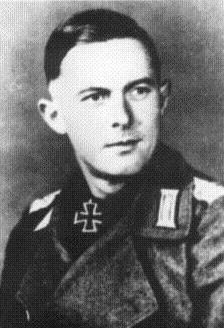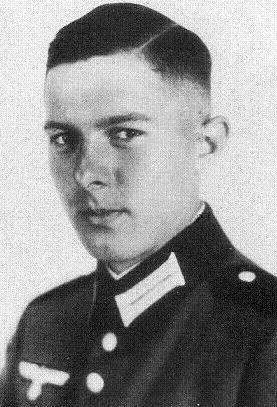Hoppe, Gerhard Ernst (Sturmgeschütz-Brigade 279)
- Date of birth:
- July 23rd, 1916 (Stettin, Germany)
- Date of death:
- October 18th, 1944 (Debilai, Lithuania)
- Nationality:
- German (1933-1945, Third Reich)
Biography
Promotions:
01.01.1938: Leutnant (469)
01.04.1940: Oberleutnant (442)
01.07.1942: Hauptmann (148)
00.00.1944: Major
Career:
10.11.1938: 3. / Artillerie-Regiment 56, Hamburg
20.04.1939: Oberleutnant, Chef, 3. Batterie, Artillerie-Regiment 56, Hamburg-Wandsbek
00.00.1941: Batteriechef, schwere Artillerie-Abteilung
00.00.1942: Sturmartillerie
00.01.1943: Artillerie-Schule Jüterbog
00.02.1943-00.06.1943: Chef, Sturmgeschütz-Batterie 247, Sardinien
15.08.1943: Kommandeur, Sturmgeschütz-Bataillon 279, Eastern Front
18.02.1944: Major, Kommandeur, Sturmgeschütz-Brigade 279
18.10.1944: Major, Kommandeur, Sturmgeschütz-Brigade 279, KIA in Debilai, Lithuania
Do you have more information about this person? Inform us!
- Period:
- Second World War (1939-1945)
- Period:
- Second World War (1939-1945)
- Period:
- Second World War (1939-1945)
- Period:
- Second World War (1939-1945)
- Period:
- Second World War (1939-1945)
- Rank:
- Major
- Unit:
- Kommandeur, Sturmgeschütz-Brigade 279
- Awarded on:
- November 29th, 1944
On the 16.10.1944 the Brigade was deployed to support the hard-pressed 561. Volksgrenadier-Division, also fighting in the East Prussia area. It knocked out several T-34s south of Wilkowischken and brought some breathing space to the Division. Its positions were already too compromised however and it was forced to pull back to the 2nd East Prussian defense line the next day. Major Hoppe and his Sturmgeschütze played an invaluable role in enabling this retreat to proceed as planned. At one point they were able to get into a Soviet tank formation and knock out 4 T-34s.
Hoppe would unfortunately be killed in action on the 18.10.1944. However the fact that without his Sturmgeschütze the Soviets would have surely achieved a breakthrough (with incalculable consequences for the 16. Armee) did not go unnoticed by the higher commands and he would receive the Knight’s Cross posthumously.
Awarded posthumously.








